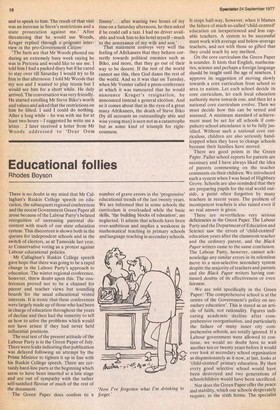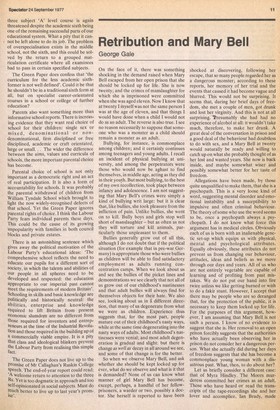Educational follies
Rhodes Boyson
There is no doubt in my mind that Mr Callaghan's Ruskin College speech on education, the subsequent regional conferences and the recent Government Green Paper all arose because of the Labour Party's belated recognition of increasing parental discontent with much of our state education system. This discontent is shown both in the queues for independent schools and in the switch of electors, as at Tameside last year, to Conservative voting as a protest against Labour educational policies.
Mr Callaghan's Ruskin College speech gave hope that there was going to be a rapid change in the Labour Party's approach to .education. The winter regional conference, however, threw doubt upon this. The conferences proved not to be a channel for parent and teacher views but sounding boards for the usual educational vested interests. It is ironic that these conferences were largely made up of those who had been in charge of education throughout the years of decline and then had the temerity to tell us how to solve the problems which would not have arisen if they had never held influential positions.
The real test of the present attitude of the Labour Party is in the Green Paper of July. There were leaks indicating that publication was delayed following an attempt by the Prime Minister to tighten it up in line with his Ruskin College speech. There are certainly hard-line parts at the beginning which seem to have been inserted at a late stage and are out of sympathy with the rather self-satisfied flavour of much of the rest of the document.
The Green Paper does confess to a number of grave errors in the 'progressive' educational trends of the last twenty years. We are informed that in some schools the curriculum is overloaded while the basic skills, `the building blocks of education', are neglected. It admits that schools have been over-ambitious and implies a weakness in mathematical teaching in primary schools and language teaching in secondary schools. It stops half-way, however, when it blames the failure of much so-called 'child-centred' education on inexperienced and less capable teachers. A system to be successful must work with average and below-average teachers, and not with those so gifted that they could teach by any method.
On the core curriculum the Green Paper is sounder. It hints that English, mathematics, science and perhaps a foreign language should be taught until the age of nineteen. I approve its suggestion of moving slowly towards a core curriculum from school to area to nation. Let each school decide its core curriculum, let each local education . authority move towards one, and then let a national core curriculum evolve. Then we must decide how this can be tested and assessed. A minimum standard of achievement must be set for all schools if compulsory school attendance is to be fully justified. Without such a national core curriculum, children are also seriously handicapped when they have to change schools because their families have moved.
There are good points in the Green Paper. Fuller school reports for parents are necessary and I have always liked the idea of parents commenting on the teacher comments on their children. We introduced such a system when I was head of Highbury Grove. Schools are also reminded that they are preparing pupils for the real world outside, a point often forgotten by many teachers in recent years. The problem of incompetent teachers is also raised even if no real answer is given.
There are nevertheless very serious deficiencies in the Green Paper. The Labour Party and the Department of Education and Science saw the errors of 'child-centred' education years after the classroom teacher and the ordinary parent, and the Black Paper writers came to the same conclusion. The Labour Party, however, cannot acknowledge any similar errors in its relentless move to a non-selective secondary system despite the majority of teachers and parents and the Black Paper writers having continued doubts of its effectiveness or even fairness.
We are told specifically in the Green Paper: 'The comprehensive school is at the centre of the Government's policy on sec ondary education'. This is stated as an arti cle of faith, not rationality. Figures indicating academic decline after com prehensive reorganisation, and particularly the failure of many inner city comprehensive schools, are totally ignored. If a Labour government were allowed to continue, we would no doubt have to wait another ten or twenty years before it would ever look at secondary school organisation as dispassionately as it now, at last, looks at 'child-centred' primary education. By then every good selective school would have been destroyed and two generations of schoolchildren would have been sacrificed.
Nor does the Green Paper offer the peace and stability, which our schools desperately require, in the sixth forms. The specialist three subject 'A' level course is again threatened despite the academic sixth being one of the remaining successful parts of our educational system. What a pity that it cannot be left alone to do its job. The problem of overspecialisation exists in the middle school, not the sixth, and this could be solved by the return to a grouped matriculation certificate where all examinees had to pass in certain specified subjects.
The Green Paper does confess that 'the curriculum for the less academic sixthformer is not well defined'. Could it be that he shouldn't be in a traditional sixth form at all, but on specialist career-orientated courses in a school or college of further education?
Parents also want something more than informative school reports. There is increasing evidence that they want real choice of school for their children: single spx or mixed, denominational or nondenominational, firm disciplined or free disciplined, academic or craft orientated, large or small. . . The wider the difference between the aims, values and curricula of schools, the more important parental choice has become.
Parental choice of school is not only important as a democratic right and an act of real participation. It is also a form of accountability for schools. It was probably the parental withdrawal of children from William Tyndale School which brought to light the now widely-recognised defects of that school. Yet the Green Paper ignores parental rights of choice. I think the Labour Party fears individual parents these days. This could be the cause of its growing unpopularity with families in both council blocks and private estates.
There is an astonishing sentence which gives away the political motivation of the Labour Party's educational ideas: 'The comprehensive school reflects the need to educate our pupils for a different sort of society, in which the talents and abilities of our people in all spheres need to be developed and respected: the education appropriate to our imperial past cannot meet the requirements of modern Britain'. Schooling in skills and basic knowledge are Politically and historically neutral: the abilities, enterprise and knowledge required to lift Britain from present economic slumdorn are no different from those required for inventors and entrepreneurs at the time of the Industrial Revolution and those required in the building up of a commercially viable empire. It is a pity that class and ideological blinkers prevent the Labour Party from realising this simple fact.
The Green Paper does not live up to the promise of Mr Callaghan's Ruskin College Speech. The end-of-year report could read: 'A welcome return to attention to the three Rs. Yet is too dogmatic in approach and too self-opinionated in social subjects. Must do much better to live up to last year's promise'.



































 Previous page
Previous page